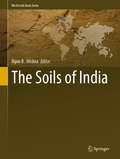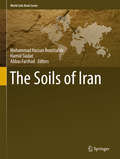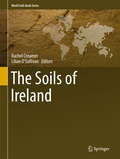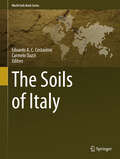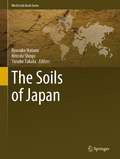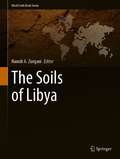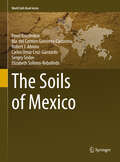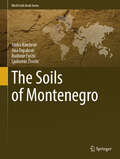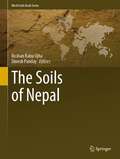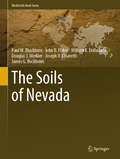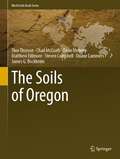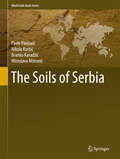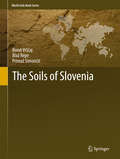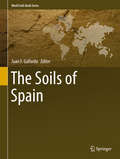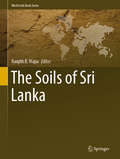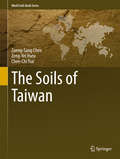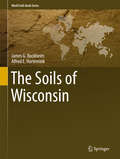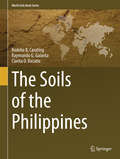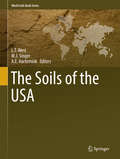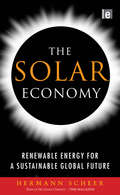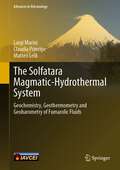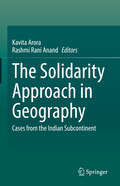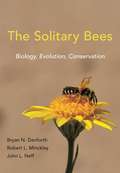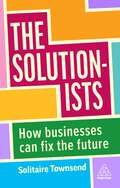- Table View
- List View
The Soils of India (World Soils Book Series)
by Bipin B. MishraThis book provides an overview of the diversified soil regimes in India. In addition to the historical advances in soil research and its limitations, it describes the monitoring of various soil conditions and soil uses to improve productivity. Discussing topics such as climate, geology and geomorphology, major soil types and their classification, soil mineralogy and clays, soil micromorphology, soil biogeochemistry, benchmark soils, land evaluation and land use planning, soil health and fertility and soil resilience, the book highlights the multiple uses of soils in industry, human health care, mitigation of challenges due to climate change and construction. It also presents measures for a brighter future of soil science in India, such as imposing organic farming principles toward sustainable agriculture in the context of the second green revolution besides alleviating the poverty and providing the employment opportunities among the farming communities in India.
The Soils of Iran (World Soils Book Ser.)
by Mohammad Hassan Roozitalab Hamid Siadat Abbas FarshadThis unique book addresses Iran’s extremely rich soil diversity and resources, which have developed under various climatic conditions ranging from dry to humid conditions. Featuring contributions by a group of respected experts on Iranian soils and agriculture, it provides comprehensive information on the management approaches needed for sustainable soil utilization and conservation under such conditions, and the attendant challenges. As such, it offers a valuable resource for anyone interested in soils and agriculture in Iran, but also in other Middle East and North African countries with similar climatic conditions. The book contains 14 chapters which illustrate the long history of indigenous knowledge and soil research, climate, geology and geomorphology, vegetation cover, soil forming factors and processes, major soils, properties and their classification. Furthermore, it presents past climate change and paleosols, agroecological zones, soil fertility, soil biology and biotechnology, human induced land degradation and “soil management in space and time”. In the end, major challenges facing the soil resources of the country are defined and recommendations are made to face the future challenges.
The Soils of Ireland (World Soils Book Ser.)
by Rachel Creamer Lilian O’SullivanThis book provides a comprehensive overview of pedology in Ireland. It describes the main soil types of the country, their functions, ecological use, and the conditions to which they were subjected associated with management over time. In addition, it presents a complete set of data, pictures and maps, including benchmark profiles. Factors involved in soil formation are also discussed, making use of new, unpublished data and elaborations. The book was produced with the support and sponsorship of Teagasc, The Agriculture and Food Development Authority, Ireland and the Irish Environmental Protection Agency.
The Soils of Italy
by Carmelo Dazzi Edoardo A.C. CostantiniThe Soils of Italy is the first comprehensive book on Italian pedology in seventy years. Taking advantage of the authors' large experience and of the most up-to-date information and technology, this book treats the main soil types of Italy, their diffusion, their functions, ecological use, and the threats to which they are subjected during centuries of intensive management. It also deals with future scenarios of the relationships between soil science and other disciplines, such as urban development, medicine, economics, sociology, and archaeology. The description of the soils is accompanied by a complete set of data, pictures and maps, including benchmark profiles. Factors of soil formation are also treated, making use of new, unpublished data and elaborations. The book also includes a history of pedological research in Italy, spanning over a century.
The Soils of Japan (World Soils Book Series)
by Ryusuke Hatano Hitoshi Shinjo Yusuke TakataThis book provides an overview of the distribution, properties, and function of soils in Japan. First, it offers general descriptions of the country’s climate, geology, geomorphology, and land use, the history of the Japanese soil classification system and characteristics and genesis of major soil types follow. For each region – a geographic/administrative region of the country – there is a chapter with details of current land use as well as properties and management challenges of major soils. Maps of soil distribution, pedon descriptions, profile images, and tables of properties are included throughout the text and appendices.
The Soils of Libya (World Soils Book Series)
by Hamdi A. ZurqaniThis book presents the soil pedodiversity in Libya. Soils are the source of all life; there can be no life without them. Further, each soil has its own history and its present conditions, which have been shaped by many different factors (e.g. climate, biota, parent material, and relief or topography). The book, divided into eight chapters, provides extensive information on Libyan soils. Chapter one provides an introduction and a broad perspective of the subject, while Chapter two covers the history of soil mapping and research in Libya. Chapter three focuses on local factors of soil formation and describes the geology and climate of the region to explain the diversity of its soils. Chapter four discusses soil classification systems and those most commonly used in the country. The fifth chapter illustrates the constraints and limiting factors that negatively affect agricultural activities across the country. The land cover/land use and the vegetation of the country are described in Chapter six. In turn, Chapter seven presents the status quo of soil biology, the corresponding related research activities, and the other biological properties of Libyan soils. The final chapter (Chapter eight) focus on land degradation and desertification in Libya, emphasizing the main causes, impacts of the phenomena, and efforts to combat it. This book demonstrates the problems that the country is currently facing as a result of climate change, soil erosion, salinization, and pollution, and outlines potential remedies to improve local food security. Bringing together the perspectives and expertise of many distinguished scientists from various universities and institutions in and outside of Libya, the book represents a unique and highly valuable resource.
The Soils of Mexico
by Carlos Omar Cruz-Gaistardo Elizabeth Solleiro-Rebolledo Ma. del Gutiérrez-Castorena Pavel Krasilnikov Robert J. Ahrens Sergey SedovMexico is an extensive country with an extremely complex mosaic of landscapes. The soils of Mexico have still not been completely studied, and there are few publications available on this subject. This book provides a state-of-the-art view on Mexican soils, their geographical distribution, their use and degradation. This is a first attempt to give a systematized characteristic of the soil resources of Mexico. Land resources of the second-biggest economy in Latin America are critical for its sustainable development, and a demand for adequate soil information is high. The information contained within can be used for any soil-related research done in Mexico and in neighboring countries. The book includes detailed characteristics of soils of all the physiographic regions of Mexico with maps, photos and explanatory schemes. The book is based on the experiences of the authors in research and soil survey, as well as on the existent, mainly 'grey' literature on Mexican soils. The book is recommended for researchers and university readers, students of all levels and decision-makers, working in the area of soil science, environmental issues, Earth sciences, land management and nature conservation.
The Soils of Montenegro (World Soils Book Series)
by Mirko Knežević Ana Topalović Budimir Fuštić Ljubomir ŽivotićDesigned to give the reader as much information and data on soil in Montenegro as possible, this book compiles all available data on soils of Montenegro and describes the genesis, morphology, physical and chemical properties of soils. It also deals with the current situation and future use of soil cover, in order to provide more information about the composition, characteristics and problems of Montenegrin soils. The classification, occurrence and distribution of some types, subtypes and varieties of soil (together with the main physical, chemical and biological characteristics and properties) are explained with the emphasis on factors of soil formation in Montenegro. The treated themes are introduced in easily accessible way, making it usable both by professionals and by anyone interested in soil use.
The Soils of Nepal (World Soils Book Series)
by Roshan Babu Ojha Dinesh PandayThis book publishes consolidated information on the soils of Nepal from all possible sources. The Survey Department, Government of Nepal, conducted two national scale soil survey projects to classify soils of Nepal (Land Resource Mapping Project ended in 1985, and National Land Use Planning Project ended in 2021). Both projects adopted the United States Department of Agriculture system of soil classification. Besides, National Soil Science Research Center (previously known as Soil Science Division) of Nepal Agricultural Research Council and Soil Management Directorate, Department of Agriculture, also worked on soils of Nepal. To date, the information on the soils of Nepal is not published in well-documented form but has been reported widely as gray literature (project report or government report) or peer-review articles.'The Soils of Nepal’ is a part of ‘World Soils Book Series’ which constitutes twelve chapters—covering broad aspects such as soil research history, climate, geology, soil classification and mapping, and soil fertility. Furthermore, information about soil properties and relation between soil constituents of the dominant soil types of Nepal and their scope of use in the context of land use are described. This book also tries to simplify the intricate relationship among soil, culture, and people. Each chapter contains a comprehensive, richly illustrated, and up-to-date overview of the soils of Nepal. We believe it fulfils a quest for a global audience including students, educators, extension workers, and soil scientists, who are interested to know the young soils of Nepal.
The Soils of Nevada (World Soils Book Series)
by James G. Bockheim Joseph V. Chiaretti Paul W. Blackburn John B. Fisher William E. Dollarhide Douglas J. MerklerThis book discusses Nevada in the context of the history of soil investigations; soil-forming factors; general soil regions; soil geomorphology; taxonomic structure of the soils; taxonomic soil regions; soil-forming processes; benchmark, endemic, rare, and endangered soils; and use of soils.With an average mean annual precipitation of 175 mm (7 in), Nevada is the driest state in the USA. More than three-quarters (89%) of the state has been mapped and the first soil survey was completed in 1909. Nevada is divided into 10 major land-resource areas and features two large deserts (the Great Basin Desert and the Mojave Desert), and over 100 north–south trending enclosed basins separated by mountain ranges (Basin and Range Province), several of which have peaks exceeding 3,400 m. Further, the soils of Nevada represent seven of the 12 globally recognized orders, 29 suborders, 69 great groups, and over 1,800 soil series, and some of the classic research on the origin of duripans and petrocalcic horizons was conducted in the state. This book presents the first report on the soils of Nevada and provides the first soil map of Nevada utilizing soil.
The Soils of Oregon (World Soils Book Series)
by Steven Campbell James G. Bockheim Thor Thorson Chad McGrath Dean Moberg Matthew Fillmore Duane LammersThis book is the only comprehensive summary of natural resources of Oregon and adds to World Soil Book Series state-level collection. Due to broad latitudinal and elevation differences, Oregon has an exceptionally diverse climate, which exerts a major influence on soil formation. The mean annual temperature in Oregon ranges from 0°C in the Wallowa and Blue Mountains of northeastern Oregon to 13 °C in south-central Oregon. The mean annual precipitation ranges from 175 mm in southeastern Oregon to over 5,000 mm at higher elevations in the Coast Range. The dominant vegetation type in Oregon is temperate shrublands, followed by forests dominated by lodgepole pine, Douglas-fir, and mixed conifers, grasslands, subalpine forests, maritime Sitka spruce-western hemlock forests, and ponderosa pine-dominated forests. Oregon is divided into 17 Major Land Resource Areas, the largest of which include the Malheur High Plateau, the Cascade Mountains, the Blue Mountain Foothills, and Blue Mountains. The single most important geologic event in Oregon was the deposition of Mazama ash 7,700 years by the explosion of Mt. Mazama. Oregon has soil series representative of 10 orders, 40 suborders, 114 great groups, 389 subgroups, over 1,000 families, and over 1,700 soil series. Mollisols are the dominant order in Oregon, followed by Aridisols, Inceptisols, Andisols, Ultisols, and Alfisols. Soils in Oregon are used primarily for forest products, livestock grazing, agricultural crops, and wildlife management. Key land use issues in Oregon are climate change; wetland loss; flooding; landslides; volcanoes, earthquakes, and tsunamis; coastal erosion; and wildfires.
The Soils of Serbia
by Pavle Pavlović Nikola Kostić Branko Karadžić Miroslava MitrovićThe main objective of this book is to present the distribution and diversity of major soil types in Serbia. It focuses on giving a detailed description of the physical, chemical and biological properties of soil and their geomorphological forms, as well as the geological characteristics of parent material. An integrative approach is used to study the interaction between climate, vegetation and geology in soil formation. Special attention is paid to human-induced soil degradation due to the erosion and contamination of soils in Serbia. The book includes a harmonization of national soil classification systems, with the FAO, WBR and ESD systems.
The Soils of Slovenia
by Borut Vrščaj Blaž Repe Primož SimončičThis books gives a complete overview of the Soils of Slovenia, from soil research history, climate, geology, geomorphology, major soil types, soil maps, soil propoerties, classification, fertility, land use and vegetation, soil management, soils and humans, soils and industries and future soils issues.
The Soils of Spain
by Juan F. GallardoThis book provides the reader with a comprehensive overview of the soils of Spain gathered by a variety of Spanish experts in the field. It presents soils in this country as particularly conditioned by the naturally diverse and drastic distribution of the Spanish landscape, characterized by mountainous ranges in the North, and arid areas in the South and the East. The first chapter sets the agricultural scenario in Spain as influenced by the Arabic culture and American agricultural products; the second chapter provides a classification and distribution of Spanish soils; the third chapter approaches the topic of soils in the characteristically humid Northern Iberia area as prone to diversity and soil evolution; the fourth focuses on the soils of the South and East of Spain as affected by lack of rainfall and abundance in calcic soil horizons; the fifth chapter deals with Mediterranean soils, having as a particular characteristic the dominance of red colors; and the last chapter discusses the challenges and future issues of Spanish soils.
The Soils of Sri Lanka (World Soils Book Series)
by Ranjith B. MapaThis book presents a comprehensive and up-to-date overview of the soils of Sri Lanka. Including sections on the soil research history, climate, geology, geomorphology, major soil types, soil maps, soil properties, soil classification, soil fertility, land use and vegetation, soil management, soils and humans, soils and industry, and future soil issues, the book summarizes the current state of knowledge in a concise and highly reader-friendly way.
The Soils of Taiwan
by Zueng-Sang Chen Zeng-Yei Hseu Chen-Chi TsaiThis book presents a comprehensive and up-to-date overview on soils of Taiwan. It includes sections on soil research history, climate, geology, geomorphology, major soil types, soil maps, soil properties, soil classification, soil fertility, land use and vegetation, soil management, soils and humans, soils and industry, future soil issues. The book summarizes what is known about the soils in Taiwan in a concise and highly reader-friendly way.
The Soils of Wisconsin
by James G. Bockheim Alfred E. HarteminkThis book provides an up-to-date and comprehensive report on the soils of Wisconsin, a state that offers a rich tapestry of soils. It discusses the relevant soil forming factors and soil processes in detail and subsequently reviews the main soil regions and dominant soil orders, including paleosols and endemic and endangered soils. The last chapters address soils in a changing climate and provide an evaluation of their monetary value and crop yield potential. Richly illustrated, the book offers both a valuable teaching resource and essential guide for policymakers, land users, and all those interested in the soils of Wisconsin.
The Soils of the Philippines
by Rodelio B. Carating Raymundo G. Galanta Clarita D. BacatioThe first soil survey in the Philippines was done by Mr. Clarence Dorsey, an American soil scientist in the province of Batangas in 1903. The Soils of the Philippines, however, is the first comprehensive summary of more than a century of soil-survey work in this country. It integrates the soil concepts of the reconnaissance soil-survey results, which commenced as early as 1934 and continued until the mid 1960s, with the semi-detailed soil surveys that continue to this day. The result is the first-ever genetic key for classifying Philippine soils at soil series level; thus, making it possible for any newcomers to the soil survey field to confidently produce their own soil map, at a more detailed map scale, to suit the project requirements. This book brings together discussions on soils and soil mapping units and up-to-date international techniques and technologies. It makes soils relevant to current political realities and national issues. As soil survey moves from a reductionist agricultural-development planning tool to a more holistic and integrated approach, to enable us to understand our dynamic and complex environment, The Soils of the Philippines will be the only source of authoritative and updated data on soil resources for macro-level resource management planning for decades to come. With a vanishing breed of experienced soil surveyors, not only in the Philippines but also worldwide, it may remain the only book on Philippine soils for the next hundred years or more. Since soils follow a geological and not a human time frame, the contents of this volume will stay relevant for soil surveyors even in a fast changing world. As the country leaps from an agricultural economy towards modernization and a more diversified economic base, some of the soil series in the Philippines, for example the Guadalupe series underlying the skyscrapers of Makati City, are becoming extinct as a result of urban development. Therefore, this book serves as the repository for the soils that we possess, the soils that have been lost through decades of urbanization while, at the same time, it creates a soil classification system for the soils we are yet to discover.
The Soils of the USA
by L. T. West M. J. Singer A. E. HarteminkThis book provides an overview of the distribution, properties, and function of soils in the U. S. , including Alaska, Hawaii, and its Caribbean territories. It discusses the history of soil surveys and pedological research in the U. S. , and offers general descriptions of the country's climate, geology and geomorphology. For each Land Resource Region (LRR) - a geographic/ecological region of the country characterized by its own climate, geology, landscapes, soils, and agricultural practices - there is a chapter with details of the climate, geology, geomorphology, pre-settlement and current vegetation, and land use, as well as the distribution and properties of major soils including their genesis, classification, and management challenges. The final chapters address topics such as soils and humans, and the future challenges for soil science and soil surveys in the U. S. Maps of soil distribution, pedon descriptions, profile images, and tables of properties are included throughout the text.
The Solar Economy: Renewable Energy for a Sustainable Global Future
by Hermann ScheerThe global economy and our way of life are based on the exploitation of fossil fuels, which not only threaten massive environmental and social disruption through global warming but, at present rates of consumption, will run out within decades, causing huge industrial dislocation and economic collapse. Even before then, the conflicts it causes in the Middle East and elsewhere will be frighteningly exacerbated. The alternative exists: renewable energy from renewable sources - above all, solar. Substituting renewable for fossil resources will take a new industrial revolution to avert the worst of the damage and establish a new international order. It can be done, and it can be done in time. The Solar Economy, by one of the world's most effective analysts and advocates, lays out the blueprints, showing how the political, economic and technological challenges can be met using indigenous, renewable and universally available resources, and the enormous opportunities and benefits that will flow from doing so.
The Solfatara Magmatic-Hydrothermal System: Geochemistry, Geothermometry and Geobarometry of Fumarolic Fluids (Advances in Volcanology)
by Luigi Marini Claudia Principe Matteo LelliThis book includes innovative gas-geothermometers and geobarometers, which are urgently needed to estimate the increasingly higher temperatures and pressures present at depth below the Solfatara volcano, owing to its on-going unrest. Therefore, in this book, new gas geoindicators, applicable up to ca. 1000°C and 3 kbar, have been implemented and applied to Solfatara fluids. The innovations of this book include: methane, having a sluggish behavior, was treated separately from fast-reacting carbon monoxide; deviations from the ideal gas behavior were considered; the effects of reaction kinetics were taken into account. This was possible because a dataset including many geochemical parameters and extending from 1983 to 2020 with a good sampling frequency is available for Solfatara, making it a case history probably unique worldwide. Nevertheless, the gas geoindicators described in this book can be applied to other similar systems. Thus, this book is of interest to many scientists studying gas geochemistry, geothermometry, and geobarometry for volcanic surveillance and the mitigation of the volcanic risk.
The Solid Earth
by C. M. R. FowlerThe second edition of this acclaimed textbook has been brought fully up-to-date to reflect the latest advances in geophysical research. It is designed for students in introductory geophysics courses who have a general background in the physical sciences, including introductory calculus. New to this edition are a section of color plates and separate sections on the earth's mantle and core. The book also contains an extensive glossary of terms, and includes numerous exercises for which solutions are available to instructors from solutions@cambridge. org. First Edition Hb (1990): 0-521-37025-6 First Edition Pb (1990): 0-521-38590-3
The Solidarity Approach in Geography: Cases from the Indian Subcontinent
by Kavita Arora Rashmi Rani AnandThis contributed volume explains the concept of solidarity and illustrates how perspectives informed by a solidarity approach can be utilized in geographic research. Geography offers a set of concepts and tools including space, place, scale, landscape, and mobility, that makes it a particularly useful lens through which to view issues of solidarity. It is distinct from other sciences in its subject matter and methodology but at the same time offers a multidisciplinary approach and transcends its disciplinary boundary. The concept of solidarity in geography is illustrated here through nearly thirty-five case chapters, all from the Indian subcontinent. Topics covered here include but are not limited to geographical approaches to solidarity in economic issues, indigenous knowledge, international relations, global geopolitics, climate change, crisis management, human health, and more.
The Solitary Bees: Biology, Evolution, Conservation
by Bryan N. Danforth Robert L. Minckley John L. Neff Frances FawcettThe most up-to-date and authoritative resource on the biology and evolution of solitary beesWhile social bees such as honey bees and bumble bees are familiar to most people, they comprise less than 10 percent of all bee species in the world. The vast majority of bees lead solitary lives, surviving without the help of a hive and using their own resources to fend off danger and protect their offspring. This book draws on new research to provide a comprehensive and authoritative overview of solitary bee biology, offering an unparalleled look at these remarkable insects.The Solitary Bees uses a modern phylogenetic framework to shed new light on the life histories and evolution of solitary bees. It explains the foraging behavior of solitary bees, their development, and competitive mating tactics. The book describes how they construct complex nests using an amazing variety of substrates and materials, and how solitary bees have co-opted beneficial mites, nematodes, and fungi to provide safe environments for their brood. It looks at how they have evolved intimate partnerships with flowering plants and examines their associations with predators, parasites, microbes, and other bees. This up-to-date synthesis of solitary bee biology is an essential resource for students and researchers, one that paves the way for future scholarship on the subject.Beautifully illustrated throughout, The Solitary Bees also documents the critical role solitary bees play as crop pollinators, and raises awareness of the dire threats they face, from habitat loss and climate change to pesticides, pathogens, parasites, and invasive species.
The Solutionists: How Businesses Can Fix the Future
by Solitaire TownsendIn the face of our climate emergency, we desperately need solutionists working to fix the future. This is your handbook for becoming the leader that the world needs.The Solutionists sets out what it takes to join the new generation of entrepreneurs, CEOs and leaders transforming business to create a more sustainable society. Using a change blueprint, this book coaches you through the steps, mindsets and strategies that will put your organization at the forefront and take personal ownership of sustainability solutions.With an inspiring selection of stories from leading entrepreneurs and organizations, this book illustrates how sustainability solutionists are paving the way to solving the biggest crisis our planet has ever faced whilst driving business innovation and growth. Including plant-based food sources, net-zero technologies and circular platforms, these stories demonstrate how sustainable disruption can transform your business, regardless of size or industry.Solitaire Townsend has been inspiring the world's top brands for over two decades and, along with some of the world's leading solutionists, she invites you to join the answer activists and grow your business while co-creating a better world.
